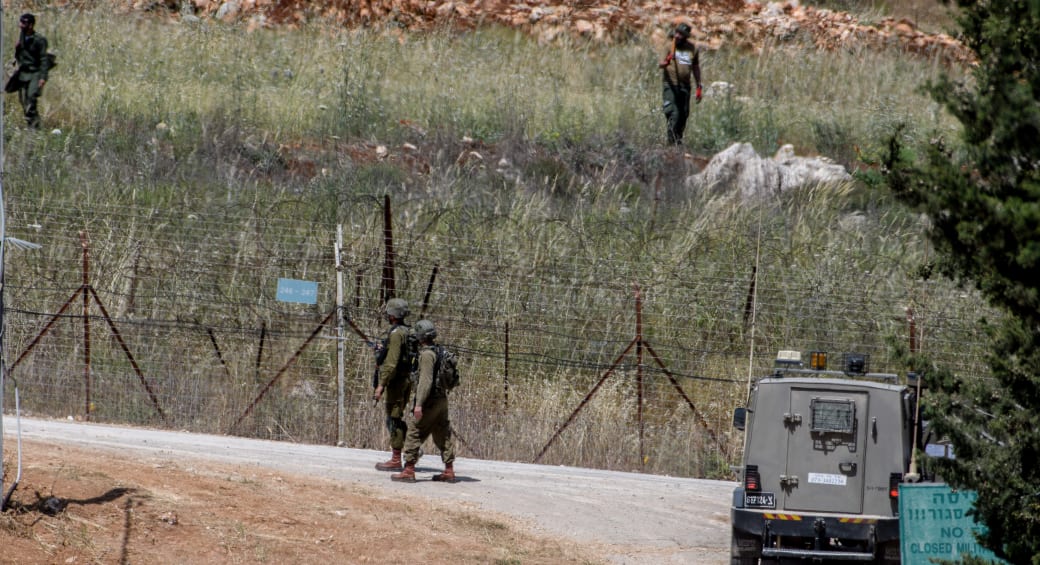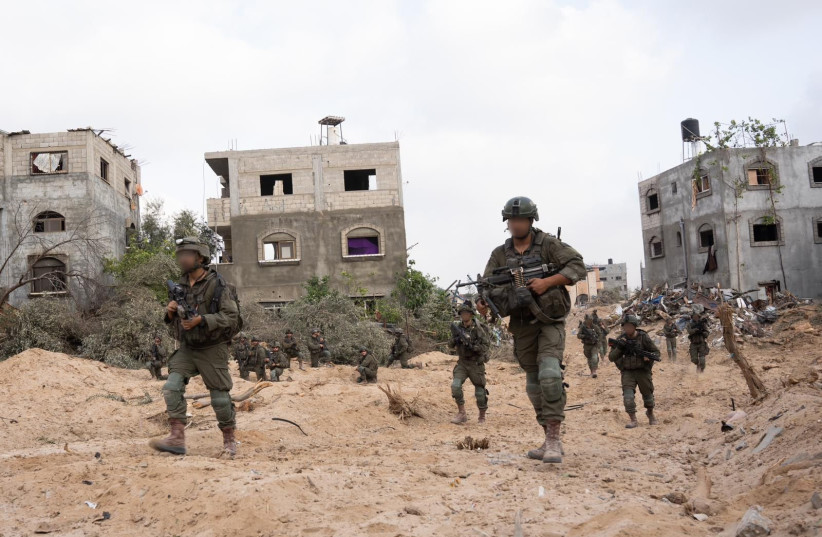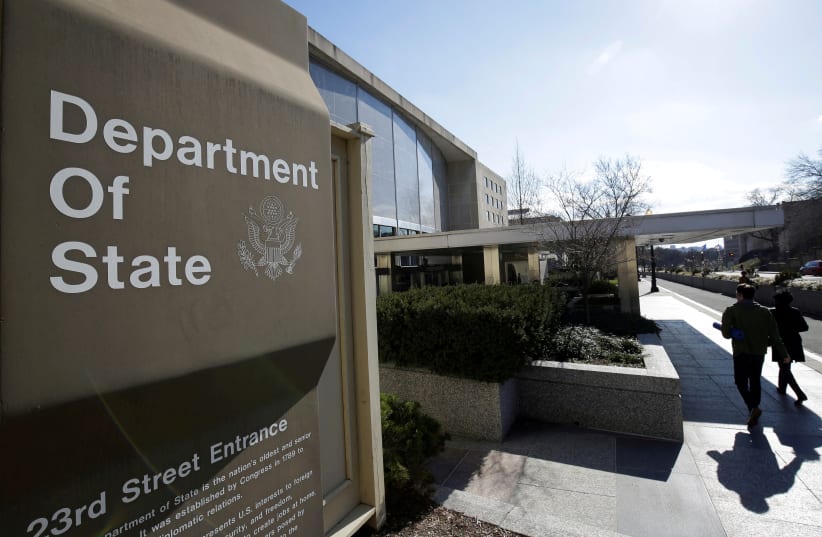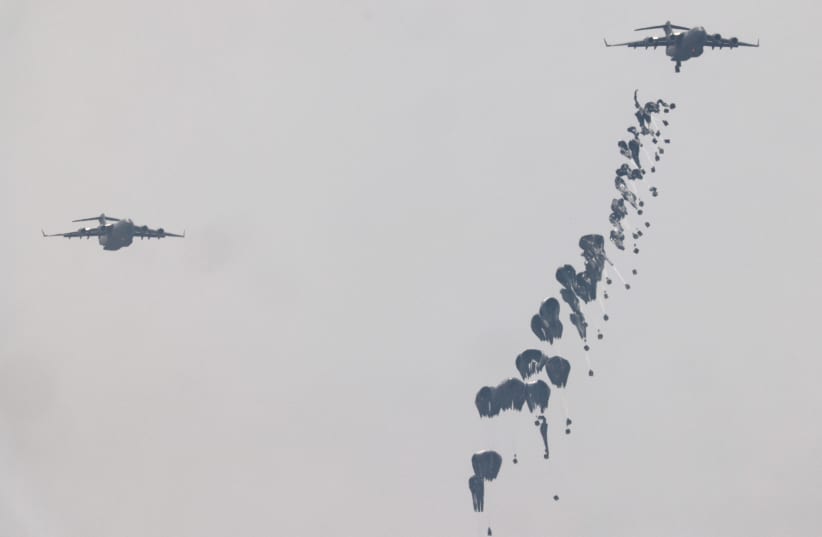Israel-Hamas War: What happened on day 200?
Two killed by alleged Israeli airstrike in southern Lebanon's Hanin •Jewish French woman allegedly raped, kidnapped to 'avenge Palestine' •Gazans discover mass grave near Nasser hospital

Israeli officials to NYT: 'Thousands of more Hamas terrorists in northern Gaza'
Some Israeli officials in the report said that rooting out Hamas terrorists may take years, US officials said its leadership remains settled in an underground network of tunnels.

Israeli officials told the New York Times on Monday that in the north of the Gaza Strip, where the IDF has waged intense and difficult fighting, there are still 4,000-5,000 armed Hamas terrorists left.
US officials have said that it is likely that Hamas will not be completely destroyed by military activity. Still, the pace of rebuilding its strength depends on the next steps that Israel will take after the fighting.
The Times report, however, states that most Hamas battalions have been "degraded and are scattered" with thousands of terrorists from the Islamist group having been killed, but notes that Israel has not achieved what it states are its two main objectives in the war: destroying Hamas and freeing the hostages.
Eventual Rafah fight
Both the IDF and Hamas are bracing themselves for Israel's eventual incursion into Rafah, which holds "Hamas’s last stronghold that Israel has not invaded," the report said. The IDF believes that eliminating the terror organization's remaining battalions there requires a ground incursion. Israeli security experts state another goal would be to destroy tunnels between Gaza and Egypt that supply Hamas with weapons, the Times reported.
Current and former US officials told the Times that the terrorist organization's leadership remains "in place" and settled in an underground network of tunnels and operation centers. The officials also said that this allows Hamas leaders "to survive and reconstitute once the fighting stops."

Retired CIA officer Douglas London was quoted by the Times saying that Hamas "still has capability, resilience, funding and a long line of people most likely waiting to sign up and join after all the fighting and all the destruction and all the loss of life.”
US intelligence has also said that Hamas will likely remain a force in Gaza when the fighting is over, and that rebuilding its own combat power would take time.
Go to the full article >>Israeli gov't committed human rights abuses in 2023, State Department says
The report, which runs 103 pages, details intentional efforts by National Security Minister Itamar Ben-Gvir to worsen conditions for security prisoners, and the denial of visits by the Red Cross.

Israel committed serious human rights violations in 2023, according to the US State Department's 2023 Country Reports on Human Rights Practices, which was released on Monday afternoon.
The section on Israel, which runs 103 pages, documents “credible reports” of more than a dozen types of human rights abuses, including extrajudicial killings, torture, arbitrary detention, conflict-related sexual violence or punishment, and the punishment of family members for alleged offenses by a relative.
“The government took some credible steps to identify and punish officials who may have committed human rights abuses,” the report noted.

Abuses of detainees, denial of Red Cross visits
The report focuses on the treatment of security detainees, particularly those held under administrative detention, without formal charges or trial dates.
“The law did not include a specific prohibition on torture and other cruel, inhuman, or degrading treatment or punishment practices, and there were credible reports that government officials employed them,” the State Department found, noting that the Israeli government “declined to reveal publicly the rules, procedures, and methods of interrogation that it stated would be kept confidential for security reasons.”
The State Department cited several local press reports, that it did not independently confirm, of autopsies performed on Palestinian detainees demonstrating evidence of abuse. It also cited reports by NGOS as well as detainee testimonies to the effect that “Palestinian detainees held by Israel were subjected to physical and sexual violence, threats, intimidation, severely restricted access to food and water, exposure to extreme c old without adequate clothing, and regular prolonged periods of isolation.”
The report also detailed an announcement on October 23 by National Security Minister Itamar Ben-Gvir of “measures to ‘make prisoners’ living spaces more crowded,’ provide mattresses instead of beds, and overall worsen living conditions,” noting that “Ben Gvir declared these measures were designed to enable prisons to absorb additional detainees accused of terrorist crimes” following the October 7 attacks.
“During a November 14 visit to a prison where Hamas members who allegedly carried out the October 7 attack were held, Ben Gvir confirmed the detainees were, according to his instructions, shackled in dark cells with seven other prisoners and subjected to harsh living conditions,” the report said.
One NGO cited in the report found the Israeli government violated a law that prohibited the detention of children younger than 12, reporting that authorities occasionally held Palestinian children younger than that age under administrative detention.
Israeli authorities were found to generally respect the rights of persons arrested on non- "security-related" criminal charges, however.
On civil liberties, a mostly positive report
The report gave Israel a generally positive review with respect to freedom of expression, citing “an independent media, an effective judiciary, and a democratic political system [that] combined to protect freedom of expression, including for members of the media.” The report cautioned, however, that “NGOs and Palestinian journalists reported authorities restricted press coverage and limited certain forms of expression, particularly for Palestinians.”
With respect to freedom of speech, the report found that “in cases of speech defined as incitement to violence or hate speech, the law empowered authorities to limit freedom of expression.” American speech protections are among the most absolute in the world.
The report detailed several cases of actions taken against citizens who were accused of expressing support for terrorist groups, including schoolteacher Meir Baruchin for posts made to social media after October 7, and the arrest of Dalal Abu Amneh, the prominent singer and doctor, following a Facebook post. It also detailed efforts by the Education Ministry to root out materials from the PA that Israel considers incitement to terrorism.
On other issues, including the right of NGOs and human rights organizations to operate in Israel, the rights of women, children, and people with disabilities, and worker rights, the report was also generally positive.
Report describes weakening of minority procections inside Israel
With respect to freedom of assembly, the report found that “The law provided for this right, and the government generally respected it," but that the government limited and restricted freedoms of peaceful assembly and association for Palestinian residents of Jerusalem.
During the conflict after October 7, the report found the government limited demonstrations for citizens expressing solidarity with the Palestinian civilian population in Gaza or calling for a ceasefire. Local and international media and NGOs also reported weakened enforcement of protections for minorities following October 7, the report noted.
"The October 7 attacks gave rise to significant concerns, including heightened fear and mistrust between Jewish and Arab citizens in daily life, impacting workplaces, campuses, and social media as well as a widespread fear of the potential for intercommunal violence within the country," the State Department said.
NGOs also identified cases cited by the report in which authorities applied different laws to residents of Jerusalem based on their ethnicity or religion, regardless of their Israeli citizenship status.
The report noted restrictions on freedom of movement caused by security measures in the West Bank. It also noted that in February, the Knesset amended Israeli law to allow the government to strip individuals convicted of terrorist acts or who have received a PA stipend following a terrorist attack of citizenship or residency.
Conflict-related abuses
According to the report, significant conflict-related abuses were documented throughout the year, but the report did not focus on conduct by Israel during the war against Hamas and its allies after October 7.
"Human rights groups reported extensive and in many cases unprecedented conflict-related abuses and alleged the commission of war crimes by Israel, Hamas, Palestinian Islamic Jihad (PIJ), and other Palestinian militant groups," the report said.
Go to the full article >>Hamas kills aid workers to manufacture Gaza food crisis, Fatah charges
A Fatah TV anchor reported that Hamas had attacked aid workers, stolen food and water and caused food prices to skyrocket in the Gaza Strip.

The Palestinian political faction Fatah charged on air that Hamas had deliberately killed aid workers, stolen aid and manufactured a food crisis in Gaza, according to a Palestinian Media Watch (PMW) investigation published on Sunday.
A Fatah TV anchor reported that Hamas had attacked aid workers, stolen food and water and caused food prices to skyrocket in the Gaza Strip – which PMW said constituted a triple crime.
“Hamas’ persecution of any party who is a source for distributing the [humanitarian] aid or securing it began from the start of the war, as Hamas persecuted well-known figures and teams of volunteers on the ground in mid-October [2023,” the anchor said. ”It attacked them and killed some of them for two reasons: Firstly, preventing any activity by any [other] party in the Gaza Strip; and secondly, ensuring Hamas control over the aid and its storage, which of course leads to these crazy and unreal prices that no one can pay in the shadow of this destruction.
“After the occupation bombed storehouses controlled by Hamas, the accumulation of tons of various food and aid products that Hamas had taken exclusivity over became clear, at a time when the Gaza Strip is suffering from hunger.”
Following the anchor’s comments, footage from an Al-Jazeera interview was played which showed a woman in the enclave complaining that “the aid isn’t reaching all the people” because the aid “is all to their [own] homes. Let Hamas catch me and shoot me and do what they want to me.”
The humanitarian crisis in Gaza
Despite a surplus of evidence indicating that Hamas is stealing aid in Gaza, The European Union's foreign policy Chief Josep Borrell claimed last month that the EU's foreign policy Chief Josep Borrell, according to Reuters.
In April, the White House also claimed that Israel had not done enough to ensure that sufficient humanitarian aid was entering Gaza.
Palestinian civilians have complained to the IDF that Hamas stole aid, The Jerusalem Post reported in January, alongside recordings of civilian testimonies.
In one recorded call, a Gazan civilian testified that Hamas murdered his cousin because he tried to seek help from UNRWA. In another conversation, a civilian said he does not leave his home because he fears Hamas will seize it and use the property to fire toward Israel and destroy his house.
Hamas leader Ismail Haniyeh has previously pushed for Islamic groups to make donations to Gaza as a form of “financial jihad” against Israel.
“Dear brothers and sisters, let us call this 'financial jihad.' The Islamic nation does not make 'donations,'” Haniyeh told a conference in Qatar. "This is not just a humanitarian issue, despite its immense importance and Gaza's need for any aid it can get. This is financial jihad. We should revive this principle of Islamic jurisprudence in our Islamic nation—the notion of waging jihad with one's life and one's money."
Go to the full article >>lsrael-Hamas war: What you should know
- Hamas launched a massive attack on October 7, with thousands of terrorists infiltrating from the Gaza border and taking some 240 hostages into Gaza
- Over 1,200 Israelis and foreign nationals were murdered, including over 350 in the Re'im music festival and hundreds of Israeli civilians across Gaza border communities
- 133 hostages remain in Gaza
- 37 hostages in total have been killed in captivity, IDF says